GLOBAL Applauds House Appropriations Subcommittee for Approving $15 Million Increase for NIH INCLUDE Initiative and Related Down Syndrome Research as Part of FY2022 Budget
July 13th, 2021 by admin
For Immediate Release:
Anca Elena Call | acall@globaldownsyndrome.org | C: (720) 320-3832
DENVER, CO – (July 13, 2021) Today, the House Appropriations Subcommittee on Labor, Health and Human Services, Education, and Related Agencies (Labor-HHS) approved their fiscal year 2022 funding bill which includes a $15 million funding increase for the National Institutes of Health’s Investigating Co-Occurring Conditions Across the Lifespan to Understand Down Syndrome (INCLUDE) initiative and related Down syndrome research.
Global Down Syndrome Foundation (GLOBAL) and our nationwide network of community advocates successfully advocated for the establishment of a trans-NIH Down syndrome research initiative in the fiscal year 2018 budget and have secured funding increases for the initiative in each year since its establishment.
GLOBAL is deeply grateful for the support and leadership of House Appropriations Committee Chair Rosa DeLauro (D-CT), Labor-HHS Subcommittee ranking member Tom Cole (R-OK), Rep. Lucille Roybal-Allard (D-CA), Rep. Jaime Herrera Beutler (R-WA), Assistant Speaker Katherine Clark (D-MA), Rep. Cheri Bustos (D-IL) and all the members of the committee who supported this year’s increase. The full House Appropriations Committee are planning to vote on the funding legislation this Thursday, July 15th, and it is likely to be considered by the House of Representatives by the end of July.
GLOBAL has led a multi-year, international advocacy campaign to build awareness among policymakers regarding unparalleled scientific opportunities related to the presence of three copies of chromosome 21 (instead of two), which causes Down syndrome. This leads to a radically different disease spectrum for people with Down syndrome, as these individuals are predisposed to or protected from major diseases that are the cause of death for over of 50% of Americans.
Thanks to GLOBAL’s leadership, a bipartisan, bicameral group in Congress included language in the fiscal year 2018 spending bill that asked the National Institutes of Health to launch a trans-NIH program led by the Office of the NIH Director to harness the power of multiple institutes to expand the science around Down syndrome and co-occurring conditions like cancer, diabetes, and Alzheimer’s disease.
The INCLUDE Initiative has been a resounding success, run out of the Office of the NIH Director with support from NIH Champions Drs. Francis Collins, Lawrence Tabak, Diana Bianchi, Gary Gibbons, and other institute directors such as Dr. Richard Hodes. The initiative has led to breakthrough and significant advances in our understanding of immune system dysregulation, new studies focused on the increased prevalence of Alzheimer’s disease among individuals with Down syndrome, and the creation of national Down syndrome Data Coordinating Center, all of which will dramatically improve the health and quality of life of individuals with Down syndrome as well as millions of individuals who do not have Down syndrome. Increased funding will help researchers pursue some of the most neglected areas of research and care such as health disparities for African Americans with Down syndrome, mosaic Down syndrome, those with the dual diagnosis of Down syndrome and autism, and new studies on metabolic research dysregulation.
About Global Down Syndrome Foundation
The Global Down Syndrome Foundation (GLOBAL) is the largest non-profit in the U.S. working to save lives and dramatically improve health outcomes for people with Down syndrome. GLOBAL has donated more than $32 million to establish the first Down syndrome research institute supporting over 400 scientists and over 2,000 patients with Down syndrome from 28 states and 10 countries. Working closely with Congress and the National Institutes of Health, GLOBAL is the lead advocacy organization in the U.S. for Down syndrome research and medical care. GLOBAL has a membership of over 130 Down syndrome organizations worldwide, and is part of a network of Affiliates – the Crnic Institute for Down Syndrome, the Sie Center for Down Syndrome, and the University of Colorado Alzheimer’s and Cognition Center – all on the Anschutz Medical Campus.
GLOBAL’s widely circulated medical publications include GLOBAL Medical Care Guidelines for Adults with Down Syndrome, Prenatal Testing and Information about Down Syndrome, and the award-winning Down Syndrome WorldTM magazine. GLOBAL also organizes the annual AcceptAbility Gala, and the Be Beautiful Be Yourself Fashion Show, the largest Down syndrome fundraiser in the world. Visit globaldownsyndrome.org and follow us on social media (Facebook & Twitter: @GDSFoundation, Instagram: @globaldownsyndrome).
###
Q&A with Dr. Francis Hickey
February 25th, 2014 by Global Down Syndrome Foundation
In recognition of Febuary as American Heart Month, the Global Down Syndrome Foundation held a Q&A with Francis Hickey, the Medical Director at the Anna and John J. Sie Center for Down Syndrome at Children’s Hospital Colorado and Linda Crnic Institute for Down Syndrome. Dr. Hickey has received one of the inaugural Crnic Institute Grand Challenge Grants, to study the pharmacokinetics of morphine in post-operative cardiac patients with Down syndrome.
1. Why do so many children with Down syndrome need to have heart surgery?
This is due to an increased percentage of heart defects in children with Down syndrome. Among the different patient populations with cardiac disease, the population with Down syndrome is unique. Approximately 40% of this patient group is born with congenital heart disease, often requiring repair within the first several years of life.
2. Please describe the nature of your research, in simple terms.
The primary goal is to improve the morphine management in patients with Down syndrome compared to those without Down syndrome before and after cardiac surgery. Measurement of morphine levels will be correlated with clinical findings in the post-operative time period to help understand pain medication needs.
3. How could your research end up benefiting people with Down syndrome?
This information will be essential in the management of post-operative pain and sedation in children with Down syndrome and congenital heart disease, as well as in general all children with Down syndrome in their pain management. This knowledge may also open a window in the challenging use of psychoactive medications in individuals with Down syndrome. Knowledge about the metabolism of morphine in these patients will guide dosing and therefore limit the clinical post-op risks and side effects these patients are exposed to in all clinical situations where pain control is needed.
Also, identifying the genetic locations which are involved in the metabolism of morphine in this patient population will lead to future understanding of the pharmacogenomics of patients with Down syndrome and assist in the development of studies leading to goal-oriented sedation protocols.
4. February is Heart Awareness Month. What heart-health advice do you have for people with Down syndrome and their families?
As with all children: Exercise regularly, eat healthy, and follow up with cardiologist as recommended.
5. How important is the Crnic Institute Supergroup in promoting collaboration?
This exciting collaboration is one of the few interactions nationally of researchers interested with basic research in Down syndrome with clinical researchers interested with the care and improved outcome of individuals with Down syndrome.
6. How important is the collaboration with The Heart Institute at Children’s Hospital Colorado?
The Sie Center for Down Syndrome collaboration with The Heart Institute at Children’s Hospital Colorado is vital to the outcome of individuals with Down syndrome with heart issues from birth on. Both clinics have ongoing interaction regarding the care of these patients. This current study is an example the collaboration of the Heart institute and the Sie Center for Down Syndrome.
7. Please tell us a little about yourself.
I grew up in Boston and am currently Medical Director at the Sie Center for Down Syndrome at Children’s Hospital Colorado. I received my undergraduate degree from Harvard University, medical degree at the University of Cincinnati College of Medicine, and completed my pediatric residency at Cincinnati Children’s Hospital Medical Center, with my fellowship in Developmental Pediatrics at Boston Children’s Hospital. In addition to my academic position for 25 years, I also was a primary care physician for 21 years in Pediatrics, including many children with special needs, including children with Down syndrome and autism. My research and clinical interests include Down syndrome clinical research, Down syndrome with the co-morbidity of autism, functional MRI application in Down syndrome, clinical database, and preterm infant outcome. My wife, Kris, and I have four children; the youngest, James, has Down syndrome and continues to teach us about life.
8. Is there anything else you’d like to add?
Our group would like to thank the Crnic Institute and Global Down Syndrome Foundation for the opportunity to hopefully open the window of pain medicine management during cardiac surgery in patients with Down syndrome as well as pain management in general.
Global, Alzheimer’s Association, Crnic Institute Announce $1.2 Million in Alzheimer’s-Down Syndrome Research Grants
October 29th, 2013 by Global Down Syndrome Foundation
The Global Down Syndrome Foundation, the Alzheimer’s Association, and the Linda Crnic Institute for Down Syndrome have awarded $1.2 million in research grants to five scientists for innovative investigations that explore the development of Alzheimer’s disease in individuals with Down syndrome. The goal is to eventually translate the findings into improved treatments for all people with Alzheimer’s.
The organizations are supporting this growing area of study through a new joint grants initiative called “Understanding the Development and Devising Treatments for Alzheimer’s Disease in Individuals with Down Syndrome.”
“The Alzheimer’s Association is very interested in understanding why people with Down syndrome are at such high risk for Alzheimer’s, and how it relates to other variations of the disease, so that we can identify new therapies to treat Alzheimer’s in both the Down syndrome and typical populations,” said Maria Carrillo, Ph.D., Alzheimer’s Association vice president of Medical and Scientific Relations. “Research in this population may also help us develop predictive tools for Alzheimer’s and design more effective clinical trials.”
“Investing with the Alzheimer’s Association has been so rewarding. The science our joint initiative is funding is of the highest caliber, and each grant approaches understanding, treating or preventing Alzheimer’s in people with Down syndrome from a very different angle. If initial results are promising, we hope that the National Institutes of Health will continue to fund this excellent science,” said Michelle Sie Whitten, executive director of the Global Down Syndrome Foundation.
Read more about the grant announcement, and learn about the researchers and their projects.
Crnic Institute to Co-Host Workshop on Cognition in Down Syndrome
April 10th, 2013 by Global Down Syndrome Foundation
 The Linda Crnic Institute for Down Syndrome will co-host the “Workshop on Cognition in Down Syndrome – Molecular, Cellular and Behavioral Features and the Promise of Pharmacotherapies” April 13-15 in Washington, D.C. The workshop will bring top scientists together to share discoveries and explore collaborations with the aim to improve the lives of people with Down syndrome.
The Linda Crnic Institute for Down Syndrome will co-host the “Workshop on Cognition in Down Syndrome – Molecular, Cellular and Behavioral Features and the Promise of Pharmacotherapies” April 13-15 in Washington, D.C. The workshop will bring top scientists together to share discoveries and explore collaborations with the aim to improve the lives of people with Down syndrome.
Katheleen Gardiner, Ph.D., a professor at the Crnic Institute and the University of Colorado School of Medicine’s Department of Pediatrics, is the workshop’s organizer. This is the third international workshop she has organized on Down syndrome and the biology of chromosome 21.
Gardiner received a grant from the Jérôme Lejeune Foundation to organize the workshop and the past two workshops she organized in 2004 and 2007. More than 130 experts from a variety of scientific disciplines are expected to attend the workshop.
“Our invited speakers are not Down syndrome researchers but may be interested in a specific gene on chromosome 21 or in some other type or specific feature of intellectual disability,” Gardiner said. “They may be persuaded to think about doing Down syndrome research and/or provide new ideas, research tools or perspectives to current Down syndrome researchers.”
Read the full press release, and view the workshop agenda and impressive lineup of speakers.
Contact Your Senators to Support the Moran Amendment for NIH Funding
March 21st, 2013 by Global Down Syndrome Foundation
 Call to Action – Research is important for people with Down syndrome, especially because Down syndrome is the least-funded genetic condition by the National Institutes of Health (NIH). The funding for Down syndrome research at the NIH started a continual and precipitous decline in the year 2001. With recent budget discussions and the possibility that NIH’s budget may decrease, there has never been a more important time to support the NIH and advocate for research funding for Down syndrome.
Call to Action – Research is important for people with Down syndrome, especially because Down syndrome is the least-funded genetic condition by the National Institutes of Health (NIH). The funding for Down syndrome research at the NIH started a continual and precipitous decline in the year 2001. With recent budget discussions and the possibility that NIH’s budget may decrease, there has never been a more important time to support the NIH and advocate for research funding for Down syndrome.
Contact your U.S. Senators TODAY to support increased funding for NIH. Tell your U.S. Senators to support the “Moran Amendment” to the Fiscal Year 2014 Budget Resolution, which would increase funding for medical research. As the U.S. Senate considers the Fiscal Year 2014 Budget Resolution, Sen. Moran will offer an amendment to increase NIH funding by $1.4 billion to allow NIH to keep up with the rate of biomedical research inflation. Medical research is important as it can significantly improve the health and lifespan of people with Down syndrome. People with Down syndrome are predisposed to certain medical conditions – an estimated 50 percent will be born with congenital heart defects, upward of 70 percent are estimated to have sleep apnea, and up to 50 percent will have the early onset of Alzheimer’s disease. Ask your Senators to commit to supporting funding for research by voting for the Moran Amendment!
Crnic Institute for Down Syndrome Awards $1.3 Million in Grants
March 20th, 2013 by Global Down Syndrome Foundation
 The Linda Crnic Institute for Down Syndrome awarded $1.3 million to 14 inaugural recipients of the Crnic Grand Challenge Grants today. The grant recipients were chosen based on the strength of the science and the likelihood the science would lead to improving outcomes for people with Down syndrome.
The Linda Crnic Institute for Down Syndrome awarded $1.3 million to 14 inaugural recipients of the Crnic Grand Challenge Grants today. The grant recipients were chosen based on the strength of the science and the likelihood the science would lead to improving outcomes for people with Down syndrome.
The Crnic Grand Challenge Grants program was established earlier this year by Tom Blumenthal, Ph.D., executive director of the Crnic Institute. The grants are available to scientists from the University of Colorado system and were awarded to researchers from various disciplines at the University of Colorado at Boulder, and the University of Colorado Anschutz Medical Campus.
Thirty-six grant proposals were reviewed by an elite group of scientists.
“The decision on which grants to fund was incredibly difficult because of the diverse, meaningful research proposed by the scientists,” Blumenthal said. “We had initially planned to fund 10 grants totaling $1 million for the first year, but we funded $1.3 million for 14 because of the truly impactful research that was proposed and is now being funded.”
Read the full press release and see a full list of the grants.
Huntington Potter of Crnic Institute Named a Charter Fellow at National Academy of Inventors
March 14th, 2013 by Global Down Syndrome Foundation
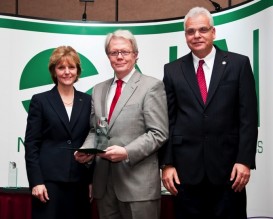 Huntington Potter, Ph.D., Director of Alzheimer’s Research at the Linda Crnic Institute for Down Syndrome and the University of Colorado School of Medicine’s Department of Neurology, was inducted into the National Academy of Inventors by being named a Charter Fellow.
Huntington Potter, Ph.D., Director of Alzheimer’s Research at the Linda Crnic Institute for Down Syndrome and the University of Colorado School of Medicine’s Department of Neurology, was inducted into the National Academy of Inventors by being named a Charter Fellow.
Potter’s groundbreaking research in the field of Alzheimer’s disease led to the discovery of the mechanistic relationship between Alzheimer’s and Down syndrome. During his esteemed career, he invented the first practical electroporation device for making transgenic organisms and has been awarded 15 U.S. patents, including several on diagnosing and treating Alzheimer’s disease.
Potter is among 101 innovators from 56 research universities and nonprofit institutes to be inaugural fellows and was inducted by the United States Commissioner of Patents, Margaret A. Focarino, at the 2nd Annual Conference of the National Academy of Inventors on Feb. 22 in Tampa, Fla. Inductees include eight Nobel Prize winners, and four recipients of the National Medal of Science, including Robert Gallo, who co-discovered the HIV virus, Solomon Snyder, who discovered the mechanism of addiction, and Nick Holonyak, who invented the first practical LED.
“Throughout his career, Huntington Potter has demonstrated the leadership and innovation the selection committee looked for in charter fellows,” said Paul Sanberg, president of the National Academy of Inventors and senior vice president for Research & Innovation at the University of South Florida. “His work has contributed materially to the understanding and treatment of Alzheimer’s disease — in particular, his discoveries regarding amyloid formation and Alzheimer’s connection to Down syndrome were breakthroughs in the field.”
Potter’s recent research includes the GM-CSF treatment for Alzheimer’s, which involves the drug Luekine. GM-CSF is a protein that is secreted by patients with rheumatoid arthritis that may help explain why those patients rarely develop Alzheimer’s disease. Mice with Alzheimer’s disease that have been injected with Leukine were cured, and the invention is being proposed as a treatment for Alzheimer’s in humans, with clinical trials underway in Tampa and soon to follow in Denver.
Read the full press release on the Global Down Syndrome Foundation’s press page.
$1.2 Million in Grants for Alzheimer’s, Down Syndrome Research
November 29th, 2012 by Global Down Syndrome Foundation
![]() The Alzheimer’s Association, the Linda Crnic Institute for Down Syndrome and the Global Down Syndrome Foundation today launched a new research initiative to better understand the development of Alzheimer’s disease in individuals with Down syndrome (DS) and translate the research into improved treatments for people at risk to develop Alzheimer’s.
The Alzheimer’s Association, the Linda Crnic Institute for Down Syndrome and the Global Down Syndrome Foundation today launched a new research initiative to better understand the development of Alzheimer’s disease in individuals with Down syndrome (DS) and translate the research into improved treatments for people at risk to develop Alzheimer’s.
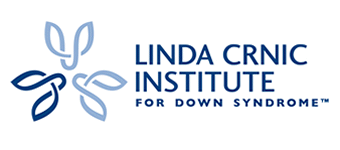 The organizations are making a total of $1.2 million available for new research projects, and have issued a Request for Applications (RFA) titled Understanding the Development and Devising Treatments for Alzheimer’s Disease in Individuals with Down Syndrome.
The organizations are making a total of $1.2 million available for new research projects, and have issued a Request for Applications (RFA) titled Understanding the Development and Devising Treatments for Alzheimer’s Disease in Individuals with Down Syndrome.
![]() “Through this new initiative, we hope to better understand the mechanisms that lead to Alzheimer’s in people with Down syndrome in order to get us a big step closer to new treatments,” said William Thies, Ph.D., Alzheimer’s Association chief medical and scientific officer. “The eventual goal is to advance the charge toward better Alzheimer’s therapies for people with Down syndrome and for people without it.”
“Through this new initiative, we hope to better understand the mechanisms that lead to Alzheimer’s in people with Down syndrome in order to get us a big step closer to new treatments,” said William Thies, Ph.D., Alzheimer’s Association chief medical and scientific officer. “The eventual goal is to advance the charge toward better Alzheimer’s therapies for people with Down syndrome and for people without it.”
“We’re pleased to have leaders that represent a significant scientific brain trust leading this program, and we are grateful to have the scientific review apparatus and peer reviewers provided by the Alzheimer’s Association,” said Michelle Sie Whitten, Executive Director of the Global Down Syndrome Foundation.
To read the full press release, click here.
Wellcome Trust Gives Nearly $4 Million for Alzheimer’s/Down Syndrome Research
November 5th, 2012 by Global Down Syndrome Foundation
 The Wellcome Trust has awarded the London Down Syndrome Consortium with 2.5 million pounds (nearly $4 million) for a Strategic Award to understand the processes involved in Alzheimer’s disease that often occurs as people with Down syndrome age.
The Wellcome Trust has awarded the London Down Syndrome Consortium with 2.5 million pounds (nearly $4 million) for a Strategic Award to understand the processes involved in Alzheimer’s disease that often occurs as people with Down syndrome age.
Dr. André Strydom, the Principal Applicant from University College London, said: “This project brings together researchers from different disciplines to tackle the cognitive problems associated with Down Syndrome. We want to understand why people with Down Syndrome are much more likely than the general population to develop Alzheimer’s disease (dementia), and we will also look for markers that can identify those who go on to develop dementia before they present with problems.”
The project, which will be a five-year study starting in December, involves research by leading geneticists, psychiatrists and neuroscientists who will be working closely with the Down’s Syndrome Association and the Down’s Syndrome All Party Parliamentary Interest Group. The project also includes North American and European collaborators to ensure the research is standardized for international programs.
The ties between Alzheimer’s disease and Down syndrome are getting fresh attention around the globe.
In the United States, the Global Down Syndrome Foundation and the Alzheimer’s Association hosted the first-ever scientific workshop to bring together researchers from both fields to plot how the two conditions can be studied together.
And the Linda Crnic Institute for Down Syndrome, the first academic home for Down syndrome research in the U.S. and a major source of the Global Down Syndrome Foundation’s support, recently hired renowned Alzheimer’s researcher Dr. Huntington Potter.
To read more about the Wellcome Trust’s research award, click here.
The Wellcome Trust is a global charitable foundation dedicated to achieving improvements in health by supporting the brightest minds in biomedical research and the medical humanities.
Scientific Workshop Discusses Alzheimer’s/Down Syndrome Research
September 14th, 2012 by Global Down Syndrome Foundation
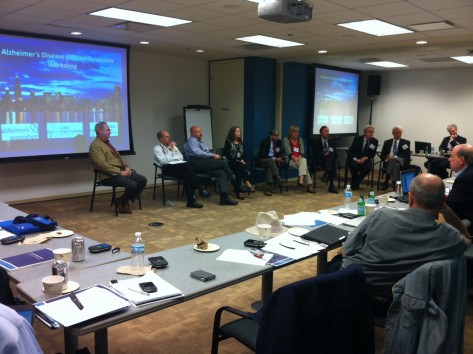
Down syndrome and Alzheimer's panelists at the Chicago workshop
The Global Down Syndrome Foundation and the Alzheimer’s Association hosted the first-ever workshop to bring together key scientists from the fields of Down syndrome and Alzheimer’s research this week in Chicago.
With the overwhelming evidence of a strong connection between Down syndrome and Alzheimer’s, and acceptance of the idea that studying people with Down syndrome is key to discovering a cure for Alzheimer’s, the workshop aimed to plot the direction of research in this emerging field.
Down syndrome occurs when a person has three copies of the 21st chromosome instead of the normal two. Studies show that one the main genes responsible for Alzheimer’s disease is on the 21st chromosome and is therefore more active in individuals with Down syndrome. Virtually 100 percent of people with Down syndrome will develop the pathology in the brain associated with Alzheimer’s disease, even if it’s not always accompanied by the same memory loss.
By fostering a closer community of research, those studying Alzheimer’s will gain the most profoundly fitting population to help find a cure, and those studying Down syndrome may obtain access to funding that didn’t exist before. Down syndrome is the least-funded genetic condition by the National Institutes of Health, despite being the most frequently occurring chromosomal disorder, affecting 1 in every 691 live births in the U.S., according to the Centers for Disease Control and Prevention.
We’ll have more details about the results of the workshop soon.

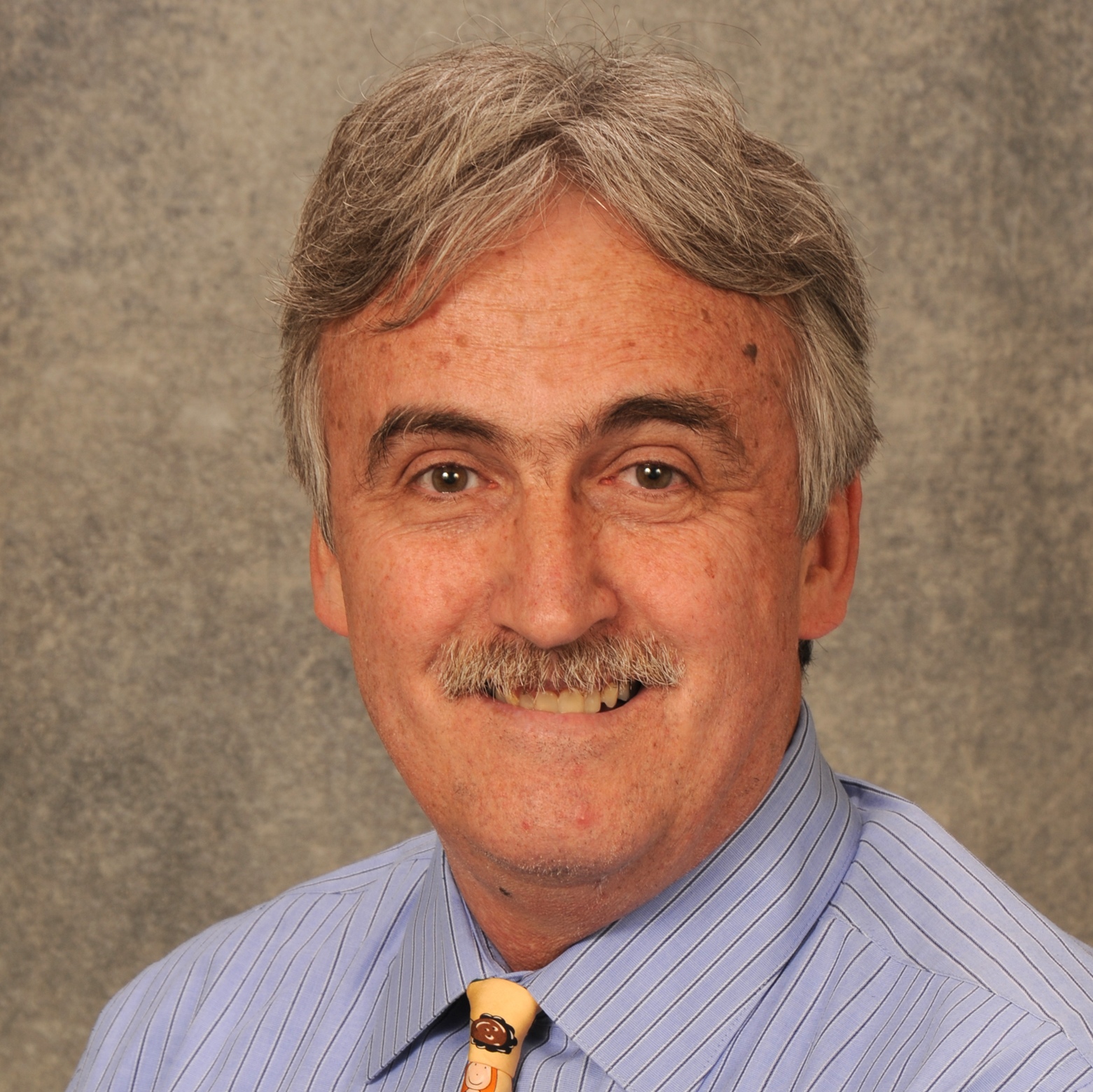

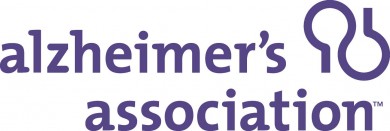
 Experience our inspirational and groundbreaking videos and photos. Our children and self-advocates are beautiful AND brilliant!
Experience our inspirational and groundbreaking videos and photos. Our children and self-advocates are beautiful AND brilliant! Make sure your local Representatives are on the Congressional Down Syndrome Task Force.
Make sure your local Representatives are on the Congressional Down Syndrome Task Force.